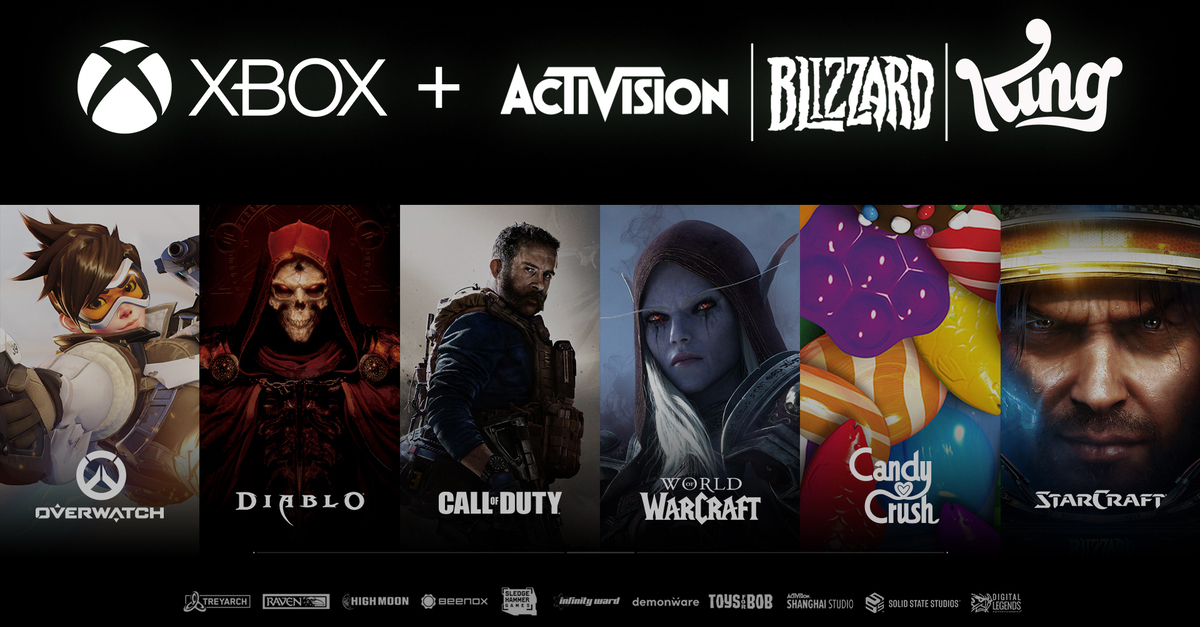
Microsoft is now defending two federal antitrust lawsuits seeking to block its $68.7 billion deal to acquire the video game giant behind popular game franchises Call of Duty, World of Warcraft, Diablo, and Candy Crush — one by the Federal Trade Commission (FTC) and the other by a group of private plaintiffs.
The plaintiffs in both cases say that if Microsoft is permitted to acquire Activision Blizzard as planned, the result would be disastrous for the video game industry and its billions of consumers.
The FTC filed an administrative complaint in early December to block the deal.
“Microsoft has already shown that it can and will withhold content from its gaming rivals,” Holly Vedova, director of the FTC’s Bureau of Competition, said in a statement about the FTC’s lawsuit. “Today we seek to stop Microsoft from gaining control over a leading independent game studio and using it to harm competition in multiple dynamic and fast-growing gaming markets.”
The FTC argued that the acquisition, which would be the largest in both video-game and Microsoft history, would result in excessive control for Microsoft. The FTC said Activision’s games are “of particular importance to console makers, including Microsoft’s competition,” and warned that post-acquisition, Microsoft “would have both the means and motive to harm competition by manipulating Activision’s pricing, degrading Activision’s game quality or player experience on rival consoles and gaming services, changing the terms and timing of access to Activision’s content or withholding content from competitors entirely.”
To bolster its case, the FTC pointed to Microsoft’s 2021 acquisition ZeniMax Media, the parent company of game developer Bethesda Softworks. Prior to the deal, Microsoft said it would not withhold ZeniMax games such as Starfield and Redfall from other consoles — but reneged and made the games Microsoft exclusives. The same would happen if Microsoft were allowed to scoop up Activision Blizzard’s games as well, the FTC says.
In the private antitrust lawsuit filed Tuesday in federal court in California, individual gamers from California, New Mexico and New Jersey say that the damage inflicted on the public by Microsoft’s resulting monopoly would be “extensive and broad.”
The 47-page complaint includes some jarring statistics: the video game industry is projected to earn $197 billion in 2022 and to reach $285 billion by 2027; half the world’s population — 3.24 billion individuals — bought and played video games in 2021; and video game playing increased 30% during the Covid-19 pandemic in 2020. The plaintiffs pointed out that the current video game landscape “has changed dramatically from its humble beginnings roughly 50 years ago, when Pong was released in 1972.”
Plaintiffs explain that the corporate side of the gaming industry has also gone through some major changes of late.
“In 2021 alone, there were 1,159 mergers worth a total of $85.4 billion, the highest in history and over three times the deal value of mergers in the video game industry in 2020,” the plaintiffs say.
Activision is not just any company, the plaintiffs explain. Rather, it is the powerhouse behind the world’s most successful games.
“Activision Blizzard is currently considered the second largest video game publisher in the United States, with a market share of 10%, behind only Microsoft,” the complaint argues, adding that the company is “one of the few game developers” that have the resources to devote to a blockbuster franchise like Call of Duty or World of Warcraft.
The gamer plaintiffs warn that if Microsoft buys Activision Blizzard, consumers will not only see increased prices, but that the game market itself will suffer from “less innovation, less creativity, less consumer choice, decreased output, and other potential anticompetitive effects” because of the merger’s potential impact on the labor market.
The plaintiffs ask that the court halt Microsoft’s acquisition and award them attorneys fees. In addition, they want the court to nullify Microsoft’s “reverse termination fee agreement.” A nullification of the reverse termination fee agreement would remove a powerful financial incentive for Microsoft to complete its acquisition plan. The agreement sets out the terms for the consequences to Microsoft of a failed acquisition: $2 billion to Activision if the merger is terminated before Jan. 18, 2023, $2.5 billion if terminated between Jan. 18, 2023 and April 18, 2023, and $3 billion thereafter.
“Gaming is the most dynamic and exciting category in entertainment across all platforms today and will play a key role in the development of metaverse platforms,” Microsoft chairman and CEO Satya Nadella said when the company announced its plan to acquire Activision in January. At the time, Nadella pledged that Microsoft is “investing deeply in world-class content, community and the cloud to usher in a new era of gaming that puts players and creators first and makes gaming safe, inclusive and accessible to all.”
A Microsoft spokesperson said in an email to Law&Crime Wednesday, “This deal will expand competition and create more opportunities for gamers and game developers as we seek to bring more games to more people.”
You can read the entire complaint here.
Counsel for the remaining parties did not immediately respond to request for comment.
[image via Microsoft]
Editor’s Note: This piece was updated from its original version to include comment from Microsoft.